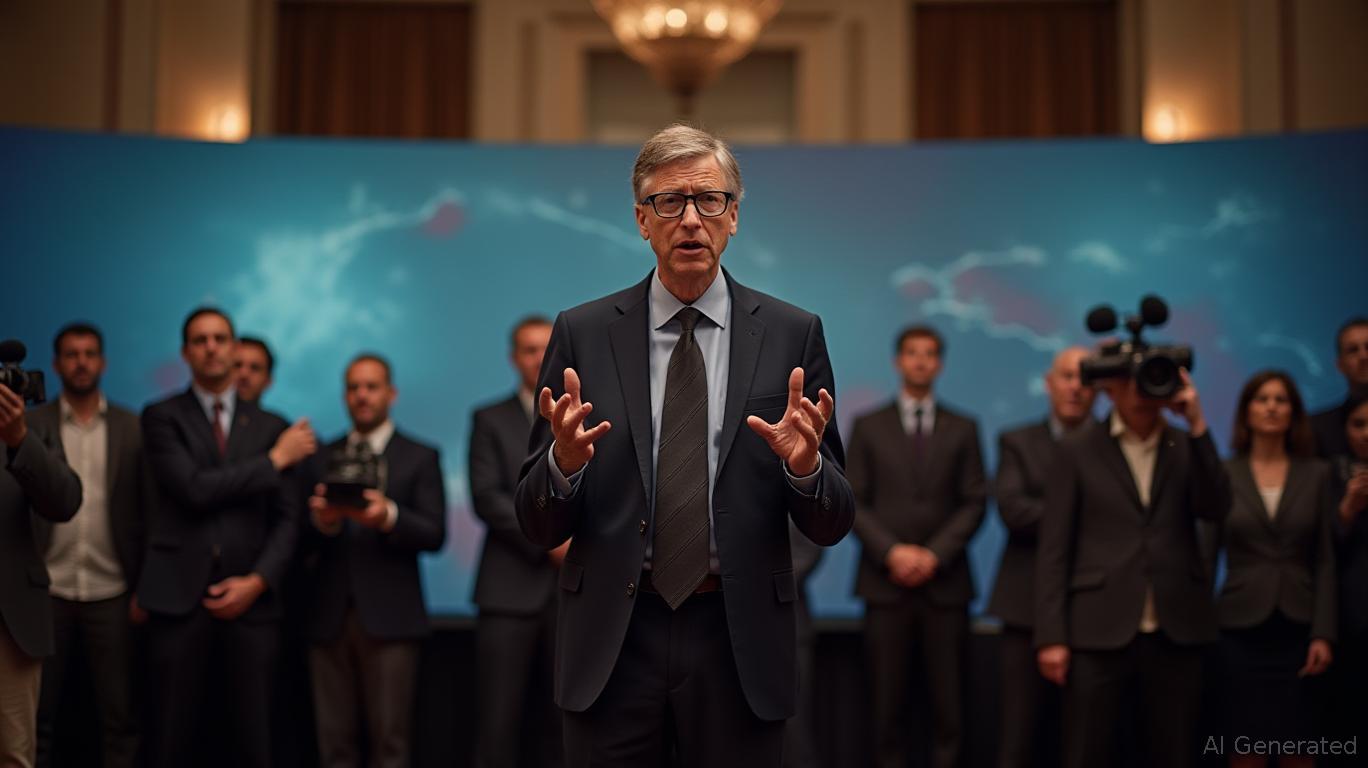Gates' Climate Transition: Balancing Human Progress and Emission Goals
- Bill Gates urges global leaders to prioritize human health and economic gains over climate doomsday scenarios, emphasizing immediate societal benefits. - He highlights clean energy innovations and "Green Premiums" to drive adoption, aligning with UN reports showing a projected 10% emissions decline by 2035. - Gates argues economic growth can reduce climate-related deaths in low-income countries by over 50% by 2100, advocating policies that measure progress by lives improved. - His Breakthrough Energy ven
Bill Gates has called on world leaders to redirect their attention from dire climate warnings to advancing public health and economic prosperity, suggesting that focusing too heavily on temperature increases may detract from more pressing social advancements. In a blog post released before the COP30 climate conference, Gates presented three "hard realities" about climate efforts, stressing that although clean energy breakthroughs are cutting emissions, the main conversation should center on concrete ways to enhance people's well-being, as highlighted in a
The most recent UN climate assessment, published shortly before Gates' blog, predicts a 10% drop in worldwide greenhouse gas emissions by 2035 if current national policies are maintained. This represents the first notable decrease since the Paris Agreement, but it is still far from the 60% cut required to keep global warming within 1.5°C of preindustrial levels. Simon Stiell, Executive Secretary of UN Climate Change, recognized the improvement but cautioned that "the pace of change remains too slow." Gates shared this view, urging a shift in climate policy to spotlight the "Green Premiums"—the cost differences that influence clean technology adoption—and to weave health and economic benefits into policy decisions, according to the Forbes report.

Gates' argument is aimed at what he sees as an "excessively pessimistic" narrative around climate change, which he feels distracts from solutions that offer multiple advantages. For example, he referenced University of Chicago research indicating that, thanks to economic development, climate-related mortality in poorer nations could be cut by more than half by 2100, even if current climate trends persist. "Accelerated and broader economic growth will save even more lives," he stated, promoting the idea that progress should be measured not only by emission cuts but also by improvements in quality of life. His Breakthrough Energy initiative, which invests in transformative climate solutions, is already focusing on technologies with significant positive Green Premiums, such as next-generation nuclear power and carbon capture, as mentioned in the Forbes article.
The context of Gates' remarks is noteworthy. As COP30 nears, countries face mounting demands to enhance their climate commitments. The UN's analysis, which is based on emissions plans from 64 nations, covers just a third of total global emissions, exposing a major shortfall in the worldwide response. Gates' emphasis on prioritizing human well-being reflects ongoing discussions about reconciling climate goals with economic growth, especially in developing economies. Nevertheless, his perspective has drawn criticism from some climate activists, who contend that reducing the focus on temperature targets could lead to complacency about the severe risks posed by global warming, the Forbes article noted.
Disclaimer: The content of this article solely reflects the author's opinion and does not represent the platform in any capacity. This article is not intended to serve as a reference for making investment decisions.
You may also like
HBAR ETF Gets Green Light, But Convincing Altcoin Doubters Remains Challenging
- Hedera's HBAR token dropped 6% post-ETF approval, contrasting with Solana's $56M debut volume. - The $8M HBAR ETF launch highlights altcoin market skepticism despite regulatory progress and institutional backing. - Technical indicators like death cross and declining on-chain metrics signal bearish momentum for HBAR. - Analysts note ETFs provide regulated institutional access, though broader crypto volatility and SEC delays dampen immediate adoption. - Hedera's enterprise partnerships and USDC growth on i

Ethereum Updates Today: The Foundation of Blockchain Enters the Public Eye as Consensys Engages with Wall Street
- Consensys, MetaMask's developer, hires JPMorgan and Goldman Sachs for IPO advisory, joining crypto peers like Circle and Bullish in public market moves. - MetaMask expands beyond wallet functionality with MASK token launch and Polymarket integration, while Consensys operates key Ethereum infrastructure like Infura and Linea. - Favorable market conditions include Fed rate cuts, SPAC fundraising growth, and institutional crypto adoption, positioning Consensys for potential 2025 listing as Wall Street embra

The CEO's Independent Journey: Creating Innovation While Navigating Solitude and Market Pressures
- Apple, Airbnb, and PepsiCo CEOs highlight leadership isolation amid innovation pressures and market volatility. - Apple introduces vapor chamber cooling for M6 iPad Pro (2027) and local ads in Maps (2026) to boost revenue. - Airbnb faces insider stock sales and post-pandemic challenges as CEO Chesky navigates hybrid work-travel shifts. - Talkspace acquires Wisdo Health to address leader loneliness through AI-driven mental health solutions. - Tesla's Tavares warns of existential risks from Chinese EV comp

Regulations and Technological Advances Shape Corporate Approaches in 2026
- Simply Good Foods (SMPL) reported a 17.5% stock drop due to Q4 2025 losses and 2026 guidance, citing flat sales and margin declines, with plans for marketing and buybacks. - British American Tobacco delayed Vuse One vape launch amid FDA scrutiny, reflecting industry-wide regulatory challenges for nicotine products and market uncertainty. - Wix partnered with PayPal to integrate AI-driven commerce tools, enabling merchants to leverage AI for product discovery and payments via agentic commerce platforms. -
